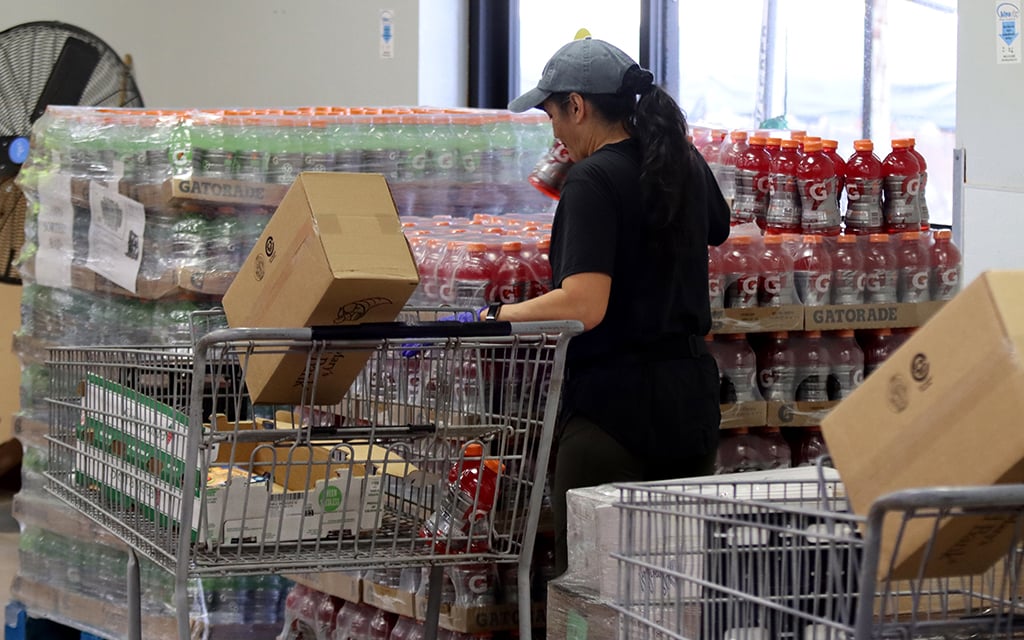LOS ANGELES – Gary Heth, who is blind, finally had a roof over his head after decades of living on the streets. And a nice roof at that.
Heth has been staying at what once was one of downtown’s better addresses, The L.A. Grand Hotel, for 19 months, under Project Roomkey, which housed the unsheltered under a federal grant in the name of public safety during the pandemic.
As of Nov. 18, there were 286 of them.
Now, with concern about COVID-19 on the wane, authorities intend to lock the door on the remaining Project Roomkey participants at The L.A. Grand Hotel and another hotel by February. It’s a bitter reality to contemplate as winter nears and the holiday season is upon us.
Heth, a Yankton Sioux from the Dakotas who also goes by the name Yellow Feather, was dismayed by the news.
“These people don’t know what the hell they’re doing,” he said. “They can’t take a homeless person off the street, put them in a nice place to live in and take them out months later.”
The wind-down of Project Roomkey underscores the trouble cities with larger homelessness problems have in dealing with the unhoused when there’s a lack of permanent quarters for them. With programs coming and going, people are forced to stay on the move if they want to avoid living on the streets. Homelessness has become one of the biggest problems facing Los Angeles County, with more than 69,000 people in its latest count, which includes people staying in shelters.
In contrast, Maricopa County in Arizona reported more than 9,000, including those in shelters.
Project Roomkey provided shelter for more than 10,000 people in California over the past two years using hotels, many of which had seen guest levels plummet as people stayed home during the pandemic. The safe, clean rooms came with access to meals, medical screenings and adequate security.
At one point, the Los Angeles Homeless Services Authority secured more than 4,000 rooms in 37 hotels. And although it’s ending Project Roomkey, the agency said it is offering housing subsidies or vouchers to those who remain in the program.
The beginning of the end for Roomkey came in August, when the City Council authorized $2.9 million to begin the wind down. That was on top of $2.5 million already approved to move some people into residential housing.
In September, advocates for people experiencing homelessness demanded Los Angeles buy the 13-story L.A. Grand Hotel and turn it into a permanent housing property. The city has not formally responded.
Heth, passing time last month in a weathered folding chair beneath a bridge near the hotel, said he’s searched for a place to live when he’s forced to leave The L.A. Grand Hotel but he’s priced out.
“It’s a lot of money out here to rent a place and I don’t have the money,” he said, adding that he has been without a stable home for 29 of his 57 years.
Sonja Verdugo, a previous Roomkey resident at The L.A. Grand Hotel said that when she and others received eviction notices, everyone was frantic and didn’t know what to do. They were left alone to fend for themselves.
“Of course, we were asking questions, and all the people down there that were in charge of running the place were just really rude and kind of shut everybody down,” Verdugo said. “Everybody was mad.”
She got lucky, finding a landlord who would accept her voucher for Section 8 government-supported housing. The Housing Authority of the City of Los Angeles said the process can take up to 60 days, leaving some landlords reluctant to participate. She said other residents of The L.A. Grand Hotel were promised permanent housing but then directed to less-desirable alternatives.
“They’re being forced to go into a shelter. I don’t understand,“ Verdugo said.


